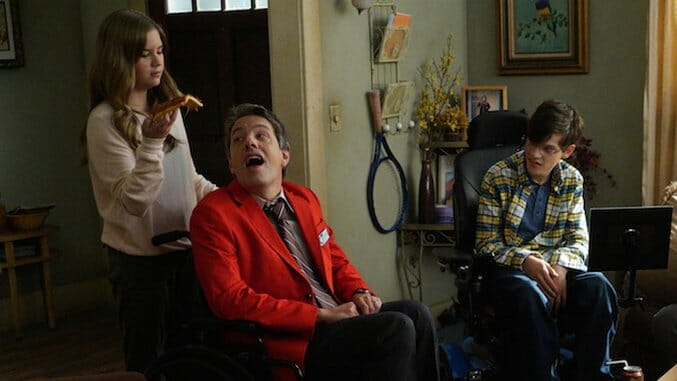Why Everyone Should Be Watching Speechless
Photo: ABC
Growing up with a disability is hard enough, but it’s often complicated by how popular culture presents what those challenges are assumed to be. Often, movies and TV series do little more than frame a disabled character as the central conflict, the problem to be surmounted by the time the credits roll. As a child, the lack of representation never bothered me, maybe because I knew Hollywood’s role as the dream factory was at cross-purposes with the desire to showcase what a person with osteogenesis imperfecta, my condition, deals with. As I’ve aged, though, the lack of representation—or, worse, misrepresentation—has begun to anger me. It seemed doubtful any film or TV series would be interested in capturing the disabled experience. That is, until ABC debuted a little sitcom called Speechless.
I had my reservations about Speechless, the story of a low-income family struggling with life and their eldest son JJ’s (Micah Fowler) cerebral palsy. I’m a Disney fan, but was there any chance a sitcom wouldn’t use disability for yucks? It wasn’t until the pilot episode, in which the matriarch, Maya DiMeo (Minnie Driver), berates her son’s principal for asking he use a side entrance to get into the school, that something happened: I smiled. I laughed. Dare I say it? I related to that experience. In my 20 years of watching movies and TV, I’d never said, “This understands me so well.” Speechless was different.
What Speechless does is utilize the problems of the typical American family, like wanting to have fun on a reduced budget or going to camp, and infuses them with the slight tweaks and adaptations disabled families make. The pilot, for example? The “first day of school” plot is nothing new, but the simple conflict of access at school makes all the difference. JJ has to pass by the trashcans to get into the building, and though that wasn’t my particular experience growing up, I related to how tone-deaf schools often are about something as simple as “just use the side door.” For 98% of audiences, that’s nothing inconvenient, but it leaves that same audience wondering how often they take access for granted.
Speechless caters to all audiences, and beautifully balances out its disability-focused plots with its main arc, which charts the DiMeos’ day-to-day lives. Too often, disability narratives present fully functional adults who have everything figured out, usually complimented by an unknown but endless source of money. The DiMeos aren’t like that: Their house isn’t a mansion, but it works for their needs—mainly to give JJ access to a good school. They can’t afford fancy vacations or a new car. They have annoying extended family members. The humor comes from their ability to adapt, and the history that inheres in that adaptation. The DiMeos don’t stop living once an episode ends: Their experiences continue, in modified form, in the real-life narratives of disabled families going through the same thing.
The desire to use a show like this for “educational” purposes is high, and while Speechless does that, it does so in a way that never makes JJ a gimmick. The Season One episode “H-e-r-Hero” discusses “Tiny Tim syndrome,” wherein disabled people are used to help able-bodied people feel better about themselves. The concept is brought up after a random student declares JJ a hero in a speech. This is a hot-button topic that many able-bodied people tend to get irritated about, and the show contextualizes it in a great way. It’s not that we don’t like the term “inspirational”—it’s when it’s applied to elevate us to a saintly status, usually as a means of generating pity in an able-bodied audience and acting as a reminder for them to appreciate their health, that it becomes irksome.
-

-

-

-

-

-

-

-

-

-

-

-

-

-

-

-

-

-

-

-

-

-

-

-

-

-

-

-

-

-

-

-

-

-

-

-

-

-

-

-








































